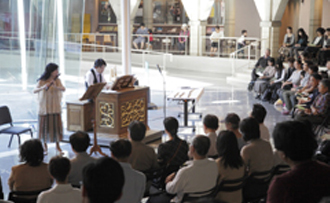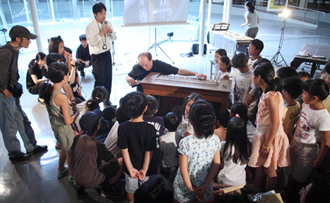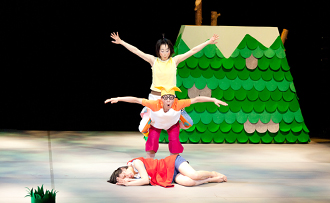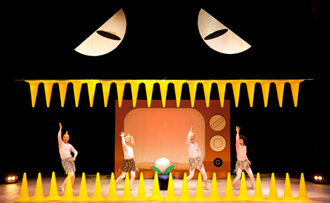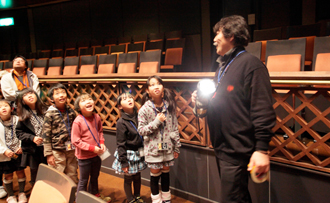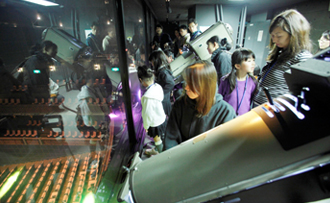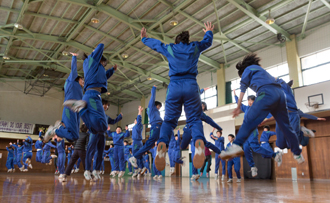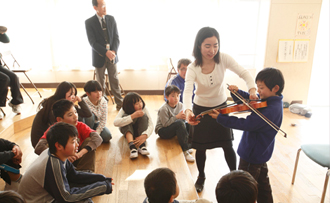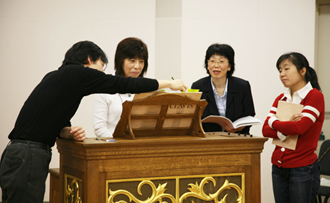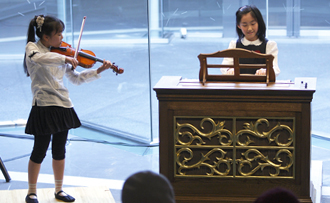- HOME
- ABOUT US
ABOUT US
SAITAMA ARTS FOUNDATION (SAF), as the designated administrator of SAITAMA ARTS THEATER and SAITAMA HALL, strives to promote performing arts and culture more, and for Saitama prefectural citizens to have full realization of affluent life in the local community. To achieve them, our missions are;
- To create and promote performing arts such as plays, dance, music of high artistic quality.
- To provide spaces for cultural activities and presentations by renting our halls, rehearsal rooms, etc.
- To support cultivating the theatrical human resources and creating their cultural activities by offering educational programs such as lectures on technical aspects of theatre.
Artistic Program
THEATER
Under the guidance of the internationally-renowned drama director Yukio Ninagawa, who has held the post of Artistic Director since 1996, Saitama Arts Theater is engaged in a number of ambitious theatrical projects as a public theater. For example, our “Sai-no-kuni Shakespeare Series” aims to stage all of Shakespeare’s 37 plays. Other projects include the “Saitama Gold Theater,” whose performers are all aged 55 or over, and the “Saitama Next Theatre,” which showcases the next-generation of young actors. We create a fully-rounded line-up that gives people from all walks of the life the chance to enjoy a wonderful theater experience, such as our programs of staging works by internationally-active directors, or the “Sai-no-kuni Family Theater” aimed at families with young children.
Saitama Gold Theater
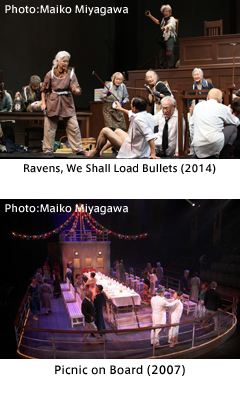
The “Saitama Gold Theater” was launched in 2006 as a performing group for senior citizens under the idea of Ninagawa, “Old age is a proof that you experienced deep emotions and many days of ordinary lives. Physical expression using this personal history might help one to discover one’s new prospective.” This troupe features performers aged 55 or older (the average age as of 2015 is 76). The group has performed new works written specially for them by leading contemporary Japanese playwrights. In recent years, they were invited to perform “Ravens, We shall Load Bullets” at Maison de la culture du Japon à Paris in 2013, Kwai Tsing Theater Auditorium, Hong Kong as a part of New Vision Arts Festival, and at Théâtre de la Ville, Paris in 2014. Saitama Gold Theatre as a globally-unique troupe has been receiving huge attention.
-
Saitama Gold Theater History
open -
2006 “Pro-cess”
“Pro-ccess2” Karasu yo Oretachi wa Tama wo Komeru (Ravens, We Shall Load Bullets)2007 Senjo no Picnic (Picnic on Board) 2008 “Pro-ccess3” Omoide no Nippon Ichimannen
Between 95 and 97 kg2009 95kg to 97kg no Aida (Between 95kg and 97 kg)
Ando-ke no Ichiya (My Night at Ando’s)2010 Seichi (Holy Place) 2011 Route 99 2012 “The Factory 1” The Swan Song, The Dressing Room 2013 Karasu yo Oretachi wa Tama wo Komeru (Ravens, We Shall Load Bullets)
“The Factory 3” Work in Progress2014 KOMA’
Karasu yo Oretachi wa Tama wo Komeru (Ravens, We Shall Load Bullets)
Saitama Next Theatre
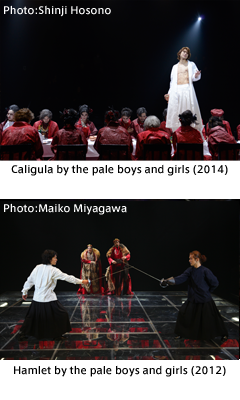
Beginning in 2009, the “Saitama Next Theatre” features young actors and aims to nurture the next generation of Japanese performers. While young performers nowadays are attracted to forms of storytelling and expression that extend from their everyday experiences, Ninagawa has a message for his troupe: “When trying to close the gap between performer and role, we mustn’t focus on the thoughts and feelings of our daily lives. Rather, we should use the powers of the imagination to evoke different feelings and worlds. Unless we do this, the power of the theater will wither away.” With this thought in mind, Ninagawa’s young group continues to perform groundbreaking theater, from early-modern Japanese dramas to Greek tragedies and Shakespeare plays. The average age as of 2015 is 25.
-
Saitama Next Theatre History
open -
2009 Sanada Fuunroku (Tale of the Sanada Family) 2010 Utsukushikimono no Densetsu (Legend of the Beauty) 2012 Hamlet by the pale boys and girls
“The Factory 2” Tennessee Williams: “The Long Goodbye” “Auto-Da-Fe”
“Talk to Me Like the Rain and Let Me Listen…” “This Property Is Condemned”2013 Oedipus Rex by the pale boys and girls
“The Factory 4“ Nine chapters based on the works of Wolfgang Borchert2014 Caligula by the pale boys and girls 2015 King Richard II
Sai-no-Kuni Shakespeare Series
Under the direction and supervision of Artistic Director Yukio Ninagawa, the “Sai-no-kuni Shakespeare Series” aims to stage all of Shakespeare’s 37 plays. Beginning with Romeo and Juliet in 1998, the series has put on such popular works as Hamlet and Macbeth as well as plays rarely staged in Japan, such as Anthony and Cleopatra and the epic trilogy Henry VI. Also popular is the “All Male Series,” which stages plays as they were originally performed, with an all-male cast. Starting with our co-production of King Lear with the Royal Shakespeare Company, the series has been successfully staged overseas such as in Stratford-upon-Avon, London, New York, and Seoul. Now it represents one of the most pioneering Shakespeare productions in Asia, and keeps receiving global attention.
-
Sai-no-Kuni Shakespeare Series History
open -
1998 Romeo and Juliet 1998 Twelfth Night 1999 Richard III 1999 King Lear
Co-production: the RSC
International tour: The Royal Shakespeare Theater, Stratford-upon-Avon and the Barbican Theater, London, UK
London, UK2000 A Midsummer Night’s Dream 2000 The Tempest 2000 The Winter’s Tale (OUDS) 2001 Macbeth
International tour: BAM Howard Gilman Opera House, New York, US (2002)2001 The Merry Wives of Windsor 2001 Love’s Labour’s Lost (OUDS) 2001 Hamlet 2003 Pericles
International tour: The Royal Shakespeare Theater, London, UK2004 Titus Andronicus 2004 As You Like It 2006 The Comedy of Errors 2006 Coriolanus
International tour: The Barbican Theater, London, UK2007 Love’s Labour’s Lost 2007 Othello 2008 King Lear 2008 Much Ado About Nothing 2009 The Winter’s Tale 2010 Henry VI 2010 The Taming of the Shrew 2011 Anthony and Cleopatra
International tour: LG Arts center, Soul, Korea2012 Cymbeline
International tour: The Barbican Theater, London, UK2012 Troilus and Cressida 2013 Henry IV 2013 The Merchant of Venice 2014 Julius Caesar 2015 King Richard II
DANCE
Saitama Arts Theater has long been a home to the best in Japanese dance. We have put together a program that surveys the international dance scene from the 1980s onwards, including works by Pina Bausch, William Forsythe, Jiří Kylián and many others. We have also staged a number of internationally co-produced works, including Pina Bausch Tanztheater Wuppertal’s “Tenchi.” In recent times, while bringing you the latest in dance performance from Japan and overseas, our line-up has tried to reflect the state of contemporary dance, with its sense of depth and a diversity that transcends genres to incorporate aspects of performing and visual arts from all over the world.
MUSIC
We try putting together a musical line-up that brings out the best of our highly-acclaimed concert hall (604 seats) for its acoustics. Our reputation as a home for piano music was cemented by the “100 Pianists” series and this has now been followed by the “Piano Étoile Series.” We bring you the best in music performances; the internationally-renowned “Bach Collegium Japan,” the ensembles featuring top-class musicians and concert series such as “Artist’s NOW” and “Masterpieces for the Next Generation”, contributing to enrich the music scene in Japan.
TRADITIONAL PERFORMING ARTS
Since its opening, Saitama Arts Theater has been introducing the best of Japanese traditional performing arts, such as Noh theatre, kyogen and rakugo. In particular, aiming to be a launch pad for new comic performances, our theater periodically holds rakugo shows. We also established our “Sai-no-kuni rakugo Grand Prize” for the best young rakugo storyteller of the year selected by the audience’s vote. Previous winners have gone on to become some of the best and most popular storytellers of today, and our theater is now attracting attention as a breeding ground for the rakugo stars of the future.
EDUCATIONAL ACTIVITES
Our theater works together with the local community to arouse an interest in the theatrical arts through the programs that allow parents and children experience and join together. We are also engaged in cooperative programs with local schools, universities and other educational institutions.
Kingdom of Orchestra
This highly-enjoyable musical concert offers a variety of programs for families to spend quality time together (the concert is open to children aged 3 and over). As well as experiencing professional orchestral sound, children can also enjoy playing music themselves at the concert’s hands-on corner.
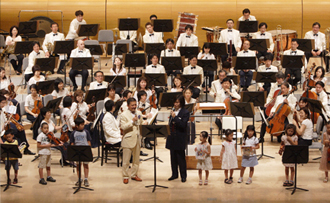
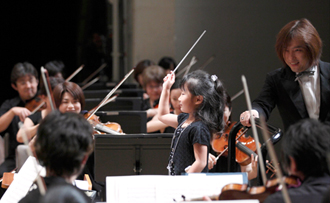
HOW TO BUY TICKETS
ticket information HOW TOBUY TICKETS
EVENT CALENDAR
SAITAMA ARTS THEATER
CLOSED
SAITAMA ARTS THEATER
2024
| MAR | 4・11・18・25 |
|---|---|
| APR | 8・15・22 |
| MAY | 13・20・27 |
| JUN | 3・10・11 |
| JUL | 1・8・18 |
| AUG | 13・19・26 |
| SEP | 9・17・30 |
| OCT | 7・21・28 |
| NOV | 5・18・19・25 |
| DEC | 2・29・30・31 |
2025
| JAN | 1・2・3・20・27 |
|---|---|
| FEB | 3・10・17・25 |
| MAR | 10・17・24 |
SAITAMA HALL
2024
| MAR | 6 |
|---|---|
| APR | 17 |
| MAY | 15 |
| JUN | 4・5 |
| JUL | 10 |
| AUG | 14 |
| SEP | 11 |
| OCT | 16 |
| NOV | 20 |
| DEC | 10・11・16・29・30・31 |
2025
| JUN | 1・2・3・15 |
|---|---|
| FEB | 12 |
| MAR | 5 |


